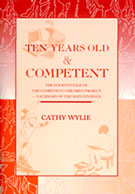
The first three stages of the Competent Children research project looked at the study children at ages 5, 6, and 8. This next stage measures their performance at age 10 when they were in their fifth school year.
Because the study has followed the children over five years it has been possible to look at the relationships of earlier experiences and resources to children's current competency levels.
Among these are early childhood education, family income levels and changes in these over time, changes in families, how children initially took to school, how they used their time, such as their use of mathematics in the home, or how long they spent watching television.
The analysis included some of the things that the children experienced at age 10, such as their out-of-school activities, and their feelings about home and school.
The study also points to ways in which children can be helped to make progress and to the importance of quality adult:child interactions.




